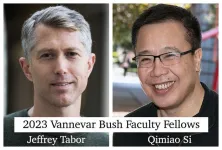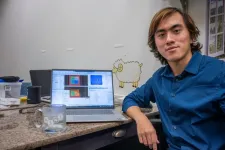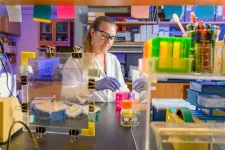(Press-News.org) The Damon Runyon Cancer Research Foundation has named six new Damon Runyon Clinical Investigators. The recipients of this prestigious award are outstanding, early-career physician-scientists conducting patient-oriented cancer research at major research centers under the mentorship of the nation's leading scientists and clinicians.
The Clinical Investigator Award program was designed to increase the number of physicians capable of moving seamlessly between the laboratory and the patient’s bedside in search of breakthrough treatments. Each awardee will receive $600,000 over three years. Because the need to repay medical school loans is often cited as a disincentive for physicians otherwise interested in pursuing research alongside their clinical practice, Damon Runyon will also retire up to $100,000 of medical school loan debt owed by the awardee. This program is possible through the generous support of the William K. Bowes, Jr. Foundation.
“The quality of research proposed by our Clinical Investigators is exceptionally strong. We are thrilled to be funding brave and bold physician-scientists who are taking risks to experimentally address the most important questions in cancer research and then translate them into improving patients’ lives,” says Yung S. Lie, PhD, Damon Runyon’s President and Chief Executive Officer. “We are helping to launch the careers of tomorrow’s brightest cancer researchers.”
Through partnerships with generous donors, industry sponsors, and its Accelerating Cancer Cures initiative, the Damon Runyon Cancer Research Foundation has committed over $84 million to support the careers of 125 physician-scientists across the United States since 2000.
2023 Clinical Investigators
Sylvan C. Baca, MD, PhD, with mentor Toni K. Choueiri, MD, at Dana-Farber Cancer Institute, Boston
Promising new treatments for cancers of the bladder and kidney have been developed, but, as with many cancer therapies, tumors eventually develop resistance. Research has shown that cancer cells resist treatment in part via epigenetic changes—those that do not affect the DNA sequence itself but turn important genes on or off, allowing cancers to survive under therapeutic stress. Dr. Baca is using novel techniques to study the epigenomes of cancer cells from blood samples. His goal is to understand how changes in the epigenomes of bladder and kidney cancers lead to treatment resistance. This knowledge will enable the design of better treatments and drug combinations that will benefit patients with metastatic bladder or kidney cancers.
Pavan Bachireddy, MD, with mentor Jeffrey J. Molldrem, MD, at University of Texas MD Anderson Cancer Center, Houston
A major cause of relapse after therapy is the persistence of measurable residual disease (MRD) cells—cancer cells that remain after treatment and eventually spread. Due to technical and logistical challenges in accessing and analyzing MRD cells, the molecular and cellular pathways that enable MRD progression remain poorly understood. Dr. Bachireddy will use innovative molecular tools to analyze tissue samples from blood cancer patients at a single-cell level to unlock insights into MRD progression. Using cutting-edge machine learning approaches, he will identify immunosuppressive mechanisms that may be targeted to halt MRD progression. Beyond these blood cancers, he aims to reveal organizing principles of MRD progression that are relevant across human cancers.
Andrew L. Ji, MD, with mentor Miriam Merad, MD, PhD, at Icahn School of Medicine at Mount Sinai, New York
Cutaneous squamous cell carcinoma (cSCC) is the second most common cancer in the U.S. While most cases are caught early and cured with excision, this cancer is more aggressive in the organ transplant recipient (OTR) population, with higher rates of recurrence and metastasis. Treatment options are severely limited in these cases. OTRs require immunosuppression, which is linked to cSCC aggression, but the underlying molecular and cellular mechanisms are poorly understood. Dr. Ji has discovered an invasive cSCC subpopulation that communicates with non-malignant cell types in the tumor’s environment. By profiling OTR tumors using cutting-edge single-cell and spatial technologies, he aims to better understand how this harmful subpopulation emerges in the immunosuppressed setting, aided by crosstalk with these neighboring cells. His goal is to develop strategies for disabling invasion and improving treatment of cSCC in both OTRs and advanced cases in the general population.
Benjamin A. Nacev, MD, PhD, with mentor Jeremy N. Rich, MD, at University of Pittsburgh, Pittsburgh
Sarcomas are a family of tumors for which there are few targeted treatments and outcomes are poor once the cancer has metastasized. Many sarcomas harbor recurrent mutations in proteins, known as epigenetic regulators, that control which genes are expressed and when. Among the regulators most frequently impacted is ATRX, which condenses regions of DNA into tightly packaged chromatin that cannot be accessed for transcription, effectively “silencing” these genes. The effect of ATRX loss in sarcomas is poorly understood, however, and treatments that leverage ATRX deficiency are lacking. Using patient-derived sarcoma cell lines and tumor samples, Dr. Nacev aims to understand epigenetic dysregulation in ATRX-deficient sarcomas, to determine how this affects antitumor immunity, and to identify new therapeutic vulnerabilities.
Fyza Y. Shaikh, MD, PhD, with mentors Cynthia L. Sears, MD, and Drew M. Pardoll, MD, PhD, at Johns Hopkins University School of Medicine, Baltimore
Immunotherapy has significantly changed how lung cancer and melanoma are treated. Unfortunately, only a small percentage of patients experience long-lasting responses. Gut bacteria have emerged as a potential predictor of how patients will respond to immunotherapy and may even be adjusted to enhance the effect of immunotherapy. Dr. Shaikh aims to identify features of the gut microbiome that correlate with immunotherapy responses. She will focus on both individual bacteria as they change over the course of treatment and the metabolites made by the entire bacterial community in the colon. The goal of this project, since gut bacteria can be modified, is to develop microbiome-based treatments to be used in combination with immunotherapy to improve response rates or overcome immunotherapy resistance for patients.
Santosha A. Vardhana, MD, PhD [Gordon Family Clinical Investigator], with mentor Charles L. Sawyers, MD, at Memorial Sloan Kettering Cancer Center, New York
Dr. Vardhana is exploring the hypothesis that gastric cancers create an inhospitable environment for immune T-cells by limiting the availability of essential nutrients needed by T-cells to produce the cytotoxic proteins that, when released, kill cancer cells. There is evidence that T-cells lose the ability to produce cytotoxic proteins within gastric tumors, while gastric tumors take up and sequester amino acids—the building blocks of all proteins, including cytotoxic proteins—such that they cannot be accessed by T-cells within tumors. Understanding and reversing this metabolic sequestration within gastric tumors may be a novel strategy to enhance T-cell immunity within gastric tumors.
******
Damon Runyon Cancer Research Foundation
To accelerate breakthroughs, the Damon Runyon Cancer Research Foundation provides today's best young scientists with funding to pursue innovative research. The Foundation has gained worldwide prominence in cancer research by identifying outstanding researchers and physician-scientists. Thirteen scientists supported by the Foundation have received the Nobel Prize, and others are heads of cancer centers and leaders of renowned research programs. Each of its award programs is extremely competitive, with less than 10% of applications funded. Since our founding in 1946, in partnership with donors across the nation, the Damon Runyon Cancer Research Foundation has invested over $430 million to fund nearly 4,000 scientists.
100% of all donations to the Foundation are used to support scientific research. Administrative and fundraising costs are paid with revenue from the Damon Runyon Broadway Tickets Service and our endowment.
For more information visit damonrunyon.org.
END
Damon Runyon Cancer Research Foundation awards $3.6 million to top clinical investigators
2023-07-20
ELSE PRESS RELEASES FROM THIS DATE:
Rice researchers earn prestigious Defense Department grants
2023-07-20
HOUSTON – (July 20, 2023) – Rice University professors Qimiao Si and Jeffrey Tabor, are recipients of prestigious Vannevar Bush Faculty Fellowships from the United States Department of Defense.
Si, a theoretical quantum physicist, and Tabor, a bioengineer and synthetic biologist, are among 10 members of the 2023 class of Bush fellows named by the department’s Basic Research Office.
The highly competitive, five-year fellowships are among the federal government’s most prestigious individual research honors. Bush fellowships are awarded annually and include $3 million to pursue ...
Discovery may lead to terahertz technology for quantum sensing
2023-07-20
HOUSTON – (July 20, 2023) – Visible light is a mere fraction of the electromagnetic spectrum, and the manipulation of light waves at frequencies beyond human vision has enabled such technologies as cell phones and CT scans.
Rice University researchers have a plan for leveraging a previously unused portion of the spectrum.
“There is a notable gap in mid- and far-infrared light, roughly the frequencies of 5-15 terahertz and wavelengths ranging from 20-60 micrometers, for which ...
USDA grant funds study of effectiveness of vegetation to curb water pollution
2023-07-20
UNIVERSITY PARK, Pa. — At a time when Pennsylvania is actively working to achieve water-quality improvements to meet the state’s obligations for cleaning up the Chesapeake Bay, a multidisciplinary Penn State research team is studying whether agricultural pollution-prevention devices called riparian buffers are working properly.
Riparian buffers — areas adjacent to streams or wetlands that contain a combination of trees, shrubs and grasses — are managed differently from the surrounding landscape to provide conservation benefits. In agricultural areas, buffers intercept sediment, nutrients, pesticides and chemicals ...
Researchers reveal why obesity makes ovarian cancer more deadly
2023-07-20
Most women with ovarian cancer are diagnosed with the most advanced form of the disease. Less than a third of those diagnosed with the disease survive five years later. As the third most common type of gynecological cancer, it led to more than 200,000 reported deaths globally in 2020 alone, according to a recent study.
In a study published this month in the Journal of Experimental & Clinical Cancer Research, University of Notre Dame researchers in collaboration with NeoGenomics Laboratories ...
Frontiers adopts CRediT to enhance clarity in research authorship
2023-07-20
Frontiers journals have adopted the Contributor Roles Taxonomy (CRediT) to improve the way authors' contributions to research are communicated and acknowledged. The new system replaces the conventional free-text authorship descriptions with a standardized and transparent system that ensures consistency and accuracy in recognizing individual contributions.
CRediT categorizes individual author contributions into well-defined roles and provides a clear, concise framework to describe the diverse contributions made by researchers ...
New findings show private equity investments in healthcare may not lower costs or improve quality of care
2023-07-20
A research team supervised by a health policy researcher at the University of Chicago has found that increasingly common private equity investments in healthcare are generally associated with higher costs to patients and payers. That’s according to a new study published July 19 in The BMJ. The study is thought to be the first systematic review of global private equity ownership trends in medical settings.
“Over the last few decades, private equity activity in healthcare has exploded, with financial institutions buying up hospitals, nursing homes and fertility ...
From chaos to light
2023-07-20
The transition to chaos is ubiquitous in nonlinear systems. Continuous-wave-driven photonic-chip-based Kerr microresonators exhibit spatiotemporal chaos, also known as chaotic modulation instability.
For more than fifteen years such modulation instability states have been considered impractical for applications compared to their coherent-light-state counterparts, such as soliton states. The latter have been the centerpiece for numerous high-profile application demonstrations, from long-range optical communication to photonic computing.
Now, researchers from the group of Tobias Kippenberg at EPFL have found a new way to harness the unique features of chaotic frequency combs to implement ...
UBC Okanagan researchers investigate new use for plastic bottles
2023-07-20
For years, unrecycled plastic bottles have been dumped in landfills. Now, thanks to new research from UBC Okanagan, those bottles may have a second life in that landfill—stabilizing its earth walls.
Used plastic bottles and textiles pose an increasing problem for landfills worldwide. Researchers say nearly a hundred million metric tons of polyethylene terephthalate (PET), also known as microplastics, are produced globally each year—with a fraction of that number being recycled—making it one of the largest sources of plastic waste.
“One ...
Bats struggle during organic farming transition
2023-07-20
Bat activity falls as farms make the transition to organic agriculture, new research shows.
Organic farming is better for biodiversity than conventional farming, which relies heavily on substances such as pesticides, herbicides and fertilisers.
However, little is known about how wildlife is affected by the transition period when a farm goes organic.
The new study, led by the universities of Bristol, Göttingen and Exeter, assessed the effects of organic farming by monitoring insect-eating bats at citrus ...
Male killer whales protected by post-menopause mothers
2023-07-20
Post-menopause female killer whales protect their sons – but not their daughters – from fights with other whales, new research shows.
Scientists studied “tooth rake marks” – the scarring left when one whale scrapes their teeth across the skin of another – and found males had fewer marks if their mother was present and had stopped breeding.
Only six species – humans and five species of toothed whales – are known to experience menopause, and scientists have long been puzzled about why this occurs.
The new study – by the universities ...







